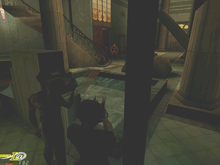The Devil Inside (video game)
The Devil Inside is a horror-themed third-person shooter video game developed by Gamesquad and published by Cryo Interactive and TalonSoft for Microsoft Windows in 2000.
| The Devil Inside | |
|---|---|
 North American cover art by Kurt Miller and Brian Weber | |
| Developer(s) | Gamesquad |
| Publisher(s) | |
| Director(s) | Hubert Chardot |
| Producer(s) | Jean-Martial Lefranc Philippe Ulrich Philippe Bayle |
| Designer(s) | Christophe Nazaret |
| Programmer(s) | Philippe Aubessard Laurent P. Paret Stéphane Chatellier |
| Writer(s) | Hubert Chardot |
| Platform(s) | Microsoft Windows |
| Release | |
| Genre(s) | Third-person shooter, survival horror |
| Mode(s) | Single-player |
Gameplay

The Devil Inside is presented as a reality television game show documenting the supernatural exploits of the protagonist Dave and his titular alter ego, a succubus named Deva. The player can transform between Dave and Deva by activating pentagrams located at certain places throughout the game's levels. During gameplay, Dave/Deva is followed by a small flying camera as well as a cameraman, and the player can switch between the two camera views as desired. Occasionally, a news helicopter will also be present and scripted cutscenes will be viewed from an aerial perspective.
The pacing, exploration, and puzzle factor of the game is similar to that of other survival horror titles. As Dave, the player has access to a variety of guns, which are equipped with laser sights to assist the player in aiming. As Deva, the player uses spells to attack enemies. Spells do not require ammunition, but do deplete mana that regenerates slowly. Some enemies generate souls when killed, and Deva can inhale souls to replenish her mana. Deva also has the ability to fly and regenerate health when standing in fire. The game uses a checkpoint save system represented by television sets found in-game.
Development
The game's script was written by Hubert Chardot, better known for his work in the Alone in the Dark series.[2] Its theme is similar to The Running Man,[3][4] written by Stephen King, whose name is mentioned early in the game.
Reception
| Reception | ||||||||||||||||||||||||||||||
|---|---|---|---|---|---|---|---|---|---|---|---|---|---|---|---|---|---|---|---|---|---|---|---|---|---|---|---|---|---|---|
| ||||||||||||||||||||||||||||||
Eric Bratcher reviewed the PC version of the game for Next Generation, rating it three stars out of five, and stated that "A compelling 'Illbleed meets Space Channel 5' diversion, but the unique presentation can't cover the weaknesses in AI and puzzle design."[11]
The game received "generally favorable reviews" according to the review aggregation website Metacritic.[5]
GameSpot's Greg Kasavin cited difficulties with the control scheme. In regards to the game's action sequences, Kasavin opined that "some of the battles are scripted very well. [...] But other times, the combat is poor." The environments of the game were praised for their realism and atmosphere, while character models and sound effects were rated as plain. Overall, the game was described as competent but lacking polish.[2] PC Gamer US praised the animations, camera angles, the use of a dual character, and the game's low learning curve. However, the reviewer cited "poor polygonal figures and texturing", and some environmental bugs as the low points of the game.[12]
In Poland, it was one of the first of the series of cheap premiere releases in the ExtraGra magazine. Shortly after the game's release, one of Poland's most popular TV stations, TVN aired a report on the game, accusing the distributor, CD Projekt of selling satanic games in commonly accessible kiosks. [13] The epilepsy warning, which by the time was already common among video games released in Poland and almost omnipresent in Europe, was used as an example of the game's exceptionally negative impact on young people.[14]
According to Der Spiegel, The Devil Inside was commercially unsuccessful.[15]
References
- Vincent Lopez (November 15, 2000). "[The] Devil Inside". IGN. Ziff Davis. Retrieved February 8, 2020.
- Greg Kasavin (November 17, 2000). "The Devil Inside Review". GameSpot. CBS Interactive. Retrieved February 8, 2020.
- Randy Sluganski (2000). "Review: The Devil Inside". Just Adventure. Archived from the original on October 30, 2001. Retrieved February 8, 2020.
- Greg Howson (May 25, 2000). "Zap the zombies, win a cheer". The Guardian. London: Guardian Media Group. Retrieved May 25, 2010.
- "The Devil Inside for PC Reviews". Metacritic. CBS Interactive.
- Scott Steinberg (November 29, 2000). "The Devil Inside". Computer Games Strategy Plus. Strategy Plus, Inc. Archived from the original on May 18, 2003. Retrieved February 8, 2020.
- Brett Todd (February 2001). "The Devil Is in the Details (The Devil Inside Review)" (PDF). Computer Gaming World. No. 199. Ziff Davis. p. 114. Retrieved February 8, 2020.
- Ewan "nach0king" Macdonald (June 15, 2000). "Devil Inside". Eurogamer. Gamer Network. Archived from the original on January 7, 2001. Retrieved February 8, 2020.
- Susi Sez (November 21, 2000). "The Devil Inside (US Version) Review". GameZone. Archived from the original on April 14, 2009. Retrieved February 8, 2020.
- Kornifex (March 23, 2000). "Test: The Devil Inside". Jeuxvideo.com (in French). Webedia. Retrieved February 8, 2020.
- Bratcher, Eric (January 2001). "Finals". Next Generation. Vol. 4 no. 1. Imagine Media. p. 112.
- "The Devil Inside". PC Gamer. Vol. 8 no. 1. Imagine Media. January 2001.
- http://polygamia.pl/extra-gra-pieklo-dziecko-lis-ksiadz-i-przedstawiciel-cdp/
- gry.wp.pl
- Martin Schnelle (May 29, 2001). "Reich durch Computerspielen". Der Spiegel (in German). Spiegel-Verlag. Archived from the original on July 21, 2018. Retrieved July 21, 2018.